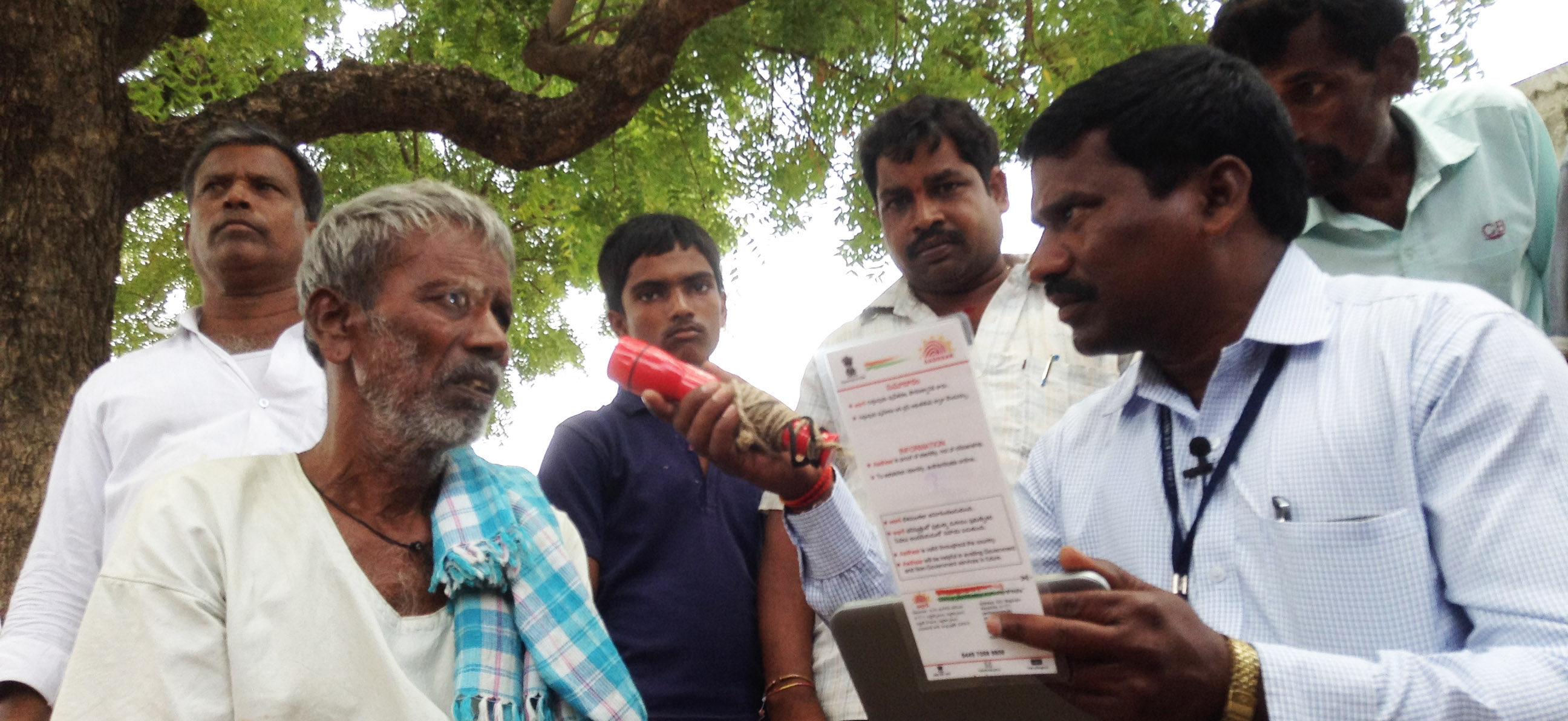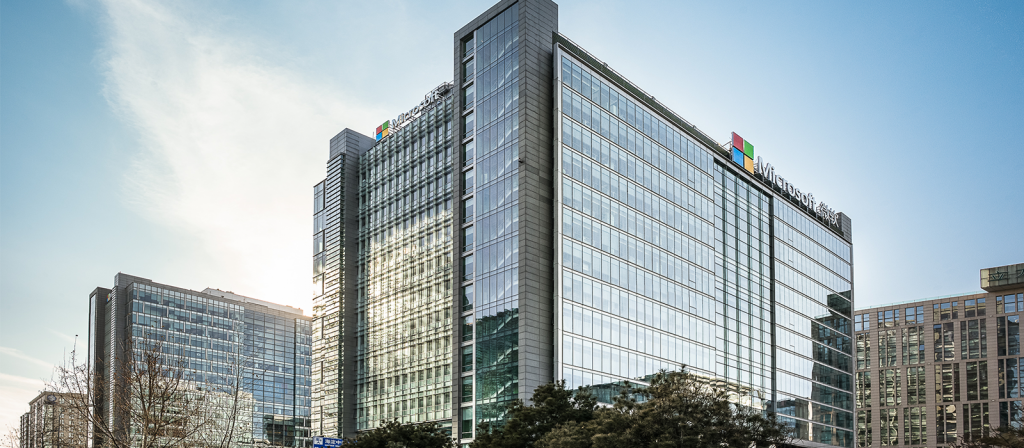
Innovating in Asia
India is home to the largest number of blind people in the world. In fact, one out of every three blind people in the world lives in India. The silver lining behind this situation is that up to 80 percent of blindness is curable or preventable, and the L V Prasad Eye Institute (LVPEI) is racing against time on this mission, and in their arsenal is a slightly unusual weapon: big data and analytics.
The institute’s eyeSmart electronic medical record project has been harnessing cloud technologies and business intelligence (BI) to increase the success of refractive surgery and improve patient care for over five years now.
LVPEI is especially interested in Azure Machine Learning, which can help predict the final expected surgical outcome of a patient based on past clinical information and insights from its algorithm. This has the potential to help save lives and reduce healthcare costs by referring patients to higher care before it is too late.
Ecosystem of Innovation
While impressive on its own, LVPEI’s project is just one of many in Asia where Microsoft is committed to helping drive innovation. The initiative by the Microsoft India Development Centre (MSIDC) reflects the innovation of a wider ecosystem in the region that also includes Microsoft Research India (MSRI), Microsoft Innovation Centers (MICs) in various countries, and the company’s fundamental research facility in the Asia-Pacific region, Microsoft Research Asia (MSRA).
A major project at MSRA revolves around urban computing, which aims to tackle big challenges in cities by using big data. This includes Urban Air, which helps identify pollution hot spots and forecast air quality both spatially and temporally.
Overseeing these potential breakthroughs is Dr Hsiao-Wuen Hon, managing director of MSRA, and corporate vice president and chairman of the Microsoft Asia-Pacific Research & Development Group. He heads what MIT Technology Review has described as “the world’s hottest computer lab”, and one naturally had to ask what it feels like to constantly be working on the next big thing.
“It’s very exciting, influenced in large part by the culture of growth hacking here at MSRA. We tackle computing’s greatest challenges in this lab every day, but what is more important than turning ideas into reality is making sure that these ideas empower the individual to achieve more”, said Dr Hon.
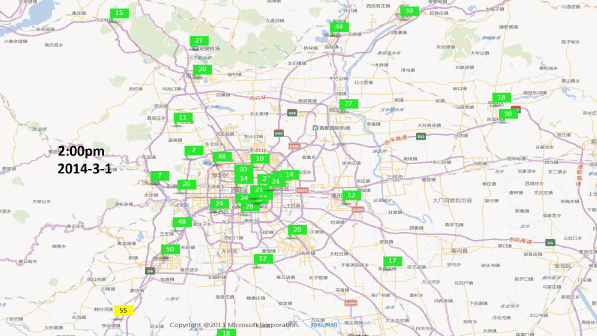
Researchers and engineers at Microsoft have aligned their innovations with the organization’s three bold ambitions: More Personal Computing, Re-Invent Productivity and Business Processes, and Build the Intelligent Cloud. Here are a few outstanding examples:
More Personal Computing

Xiaoice: Possibly the largest Turing test in history
Over 40 million people in China and Japan have interacted with this chatbot called Xiaoice (Rinna in Japan), and a quarter of them have professed their love to her. Talking to Xiaoice can feel like conversing with another human; she has her own opinions, remembers details of past conversations, changes her mind, and can even crack a joke if she senses you are feeling down. Her listening and communication skills have even led to job offers such as a relationship therapist and weather anchor!
Xiaoice’s ability to self-learn not only marks a huge stride in artificial intelligence, but also how seamless computer programs like her can integrate into our lives. She represents the potential for technology to feel more personal, and perhaps make people happier.
Skype Translator: Be a digital polyglot
If your desired superpower is the ability to speak any language, Skype Translator is probably the closest thing to having that wish come true. Developed by the Machine Translation team of Microsoft Research, the application offers real-time speech translation in eight languages – English, French, German, Italian, Mandarin, Portuguese, Arabic and Spanish, and text translation in more than 50 languages, and enables people to communicate and collaborate better without feeling held back by language.
Built on machine learning technology that gets smarter with usage, it also teaches itself to avoid lingual faux-pas over time. We may not always speak the same language, but Skype Translator makes sure that does not form a barrier to friendship.
Re-Invent Productivity and Business Processes
UNDP-MIC Windows Phone app: Changing disaster response
When a 7.8 magnitude earthquake struck Nepal in April 2015, a massive coordination effort began to deal with the many dead, wounded, replaced as well as repair the damaged infrastructure.
Whether it’s a house or public building, teams mobilized by the United Nations Development Programme (UNDP) must make an official damage assessment before demolition can begin. This process has traditionally been done over paper and spreadsheets.
MIC Nepal saw no need to place further strain on resources. Instead, it proposed a Windows Phone app which would record all the data and store it in the cloud – coordinates of each building, structural measurements, photographs and other relevant details. Digitalizing the records cut equipment costs from $2,000 to $70, and allowed the managing committee to monitor progress in real-time, among other functions like calculating the volume of debris and the time it will take to move it.
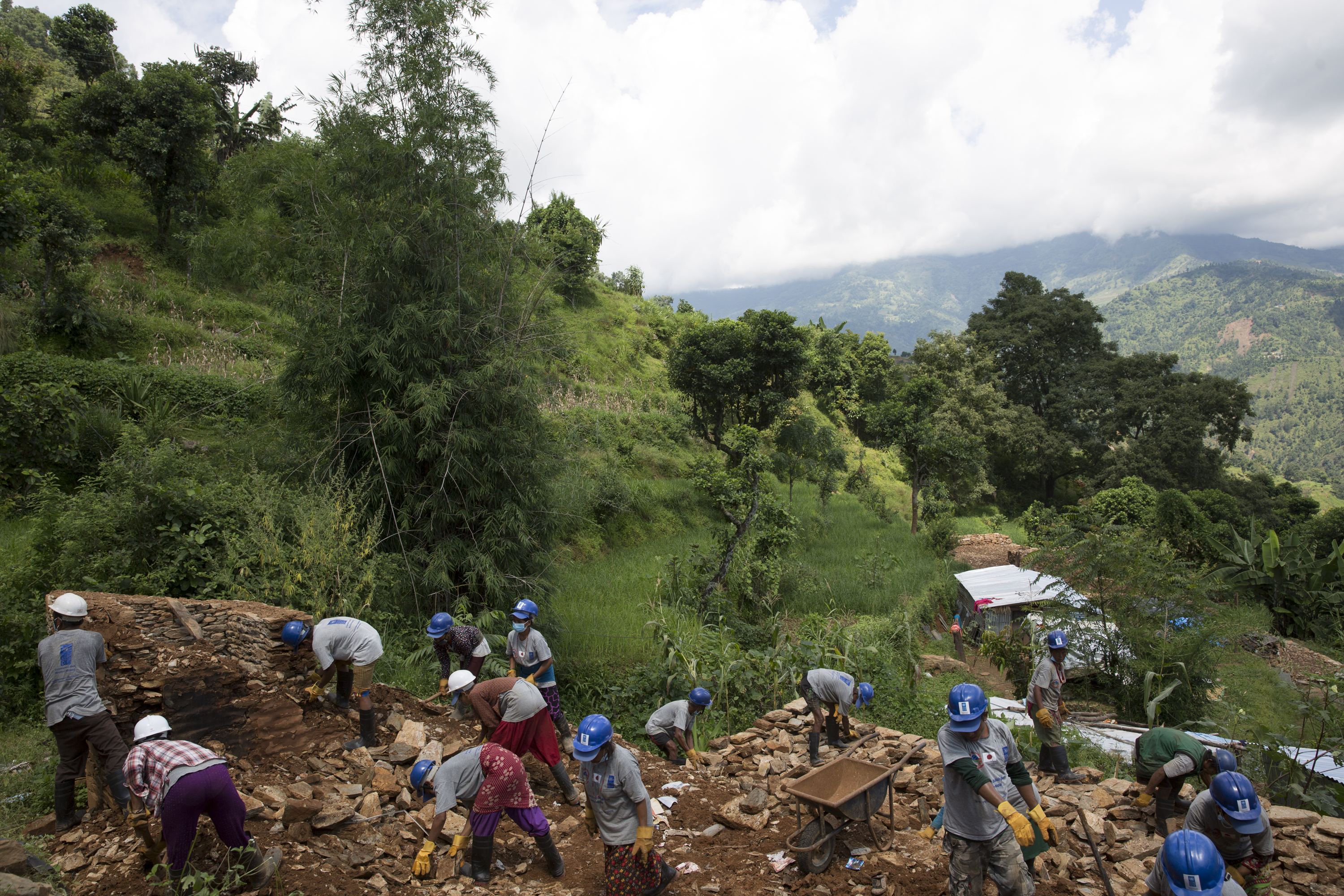
Build The Intelligent Cloud
Virtual AGRI Service: Cutting farmers a fairer deal
Oftentimes, high-tech farming conjures images of vertical farms or indoor farms with fancy LED lighting. Not so in rural parts of India, where it is likelier to be defined as the use of cloud technologies to help farmers overcome a lack of market integration and access to services like supply of credit. Virtual AGRI Service (VAS), developed by PALS Global in partnership with Microsoft BizSpark, is one such solution intended to help farmers beat the odds stacked against them.

Deployed in the Indian state of Andhra Pradesh, VAS helps thousands of farmers from crop planning to selling of harvests. Via the Azure cloud, farmers can seek advice from experts miles away on matters like pest control, and connect directly with buyers to earn more from their produce. The service is available in vernacular Indian languages as well, so no farmer is at a disadvantage speaking a particular dialect.
VAS has been an invaluable resource in terms of securing the livelihoods of 10,000 farmers in Andhra Pradesh. Equally important, though less apparent, is how it has revamped the profession; agriculture has gone from being perceived as poorly remunerated to being precision driven and profitable, drawing youth back to the fields and ensuring food security of the nation for years to come.
ICRISAT: Making sure the rice bowl doesn’t break
Andhra Pradesh is popularly known as the “rice bowl of India”, but this agricultural state has been suffering from rainfall deficit and climate change in recent times. To ensure optimal harvests so farmers’ livelihoods are not at risk, International Crops Research Institute for the Semi-Arid Tropics (ICRISAT), Microsoft and the Andhra Pradesh government have teamed up to develop a sowing application complete with a Personalized Village Advisory Dashboard.
The app is like the all-knowing advisor to farmers, recommending to them the best time to sow crops depending on weather conditions, soil and other indicators. Using cloud-based predictive analytics and artificial intelligence to interface with weather forecasting models, it helps to reduce crop failures and increase yield, in turn, reducing stress and generating better income.
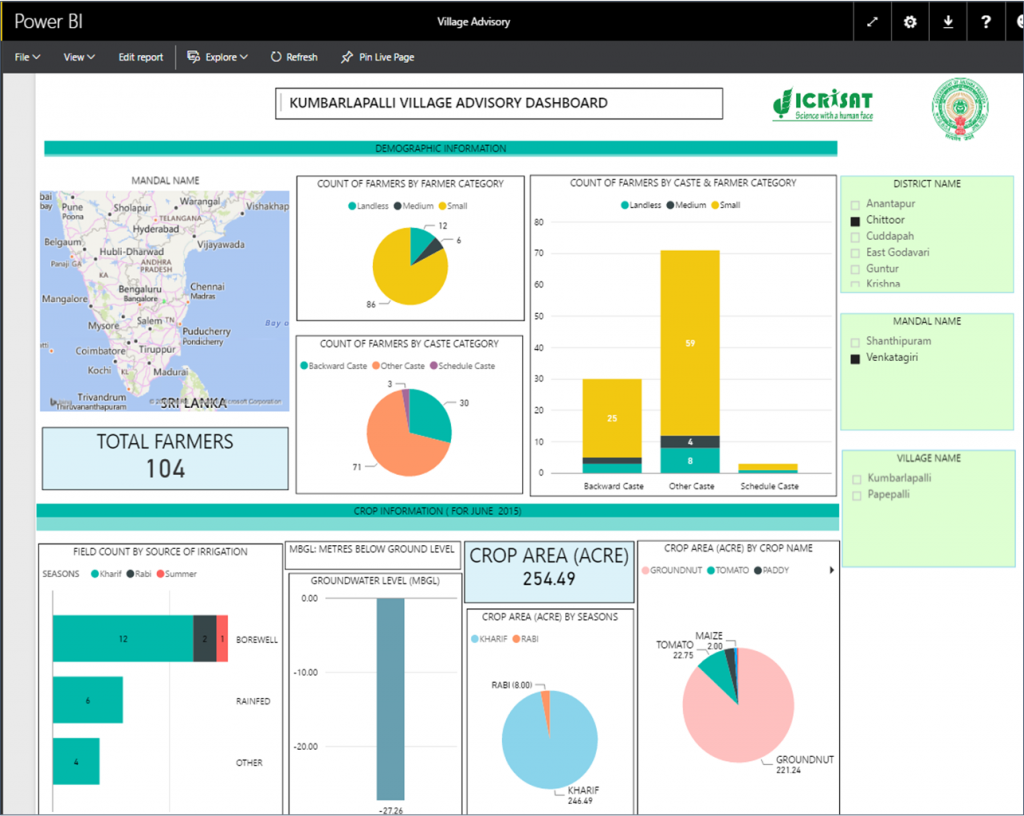 Agriculture is a crucial economic contributor in India, and the implementation of advanced analytics in this sector has been a great boon in streamlining and strengthening farming practices. The app developed by ICRISAT in collaboration with Microsoft and state officials has paved the way for digital agriculture, and if all goes to plan, similar efficiencies can be brought to healthcare, education and beyond.
Agriculture is a crucial economic contributor in India, and the implementation of advanced analytics in this sector has been a great boon in streamlining and strengthening farming practices. The app developed by ICRISAT in collaboration with Microsoft and state officials has paved the way for digital agriculture, and if all goes to plan, similar efficiencies can be brought to healthcare, education and beyond.
Achieve More… Together
If individuals can be empowered to achieve more, then a group can surely be game-changers. Microsoft appreciates working with external parties to unlock greater potential and has collaborations ranging from joint research programs with universities in Asia, to investment in promising start-ups.
SwimTrain: Making a bigger splash together
For most people, swimming is a solo activity: you get into the pool, and swim back and forth till you complete a certain number of laps. But why should the sport, one of the best ways to get fit for the full-body workout it offers, be subject to exercise boredom? That was the question bothering researchers from the Korea Advanced Institute of Science and Technology (KAIST) and MSRA, and together they devised SwimTrain, a cooperative “exergame” which makes swimming more fun and sociable by having swimmers team up and adjust their speed to achieve a collective goal.
To soak in the immersive experience of SwimTrain, swimmers slip their phones into a waterproof case and plug in waterproof headphones. They then match up to form a virtual “train”, with each player controlling the speed of their own compartment. As the “train” moves, information is fed to a Network Manager on the Microsoft Azure cloud and delivered back to the game as rank and round data, determining the status of each player. Feedback is provided to swimmers through narration, vibration feedback and sound effects, making this interval training plan unique. Swimmers never have to swim alone again, and the gamification SwimTrain has enabled is made possible by Microsoft’s close relationships with partners in academia.
Microsoft Accelerator: Investing in tomorrow, today
To help promising start-ups realize their full potential, the Microsoft Asia-Pacific R&D Group funds the Microsoft Accelerator (MA) in Beijing. The Beijing Accelerator offers not just platform and tools, but also world-class resources, knowledge and expertise, and access to investors and customers as well the start-ups need to become successful companies.
Since the Beijing Accelerator was established in 2012, 126 start-ups have graduated from its program. Collectively, they reach 500 million individual users and manage more than 1 million enterprise accounts with their products and services. More than 93% have raised follow-on rounds of financing.
As of today, the total market valuation for the graduates add up to RMB 38 billion (US$5.6 million), and their market valuation grew by more than 600% after joining the Microsoft Beijing Accelerator program. Such stellar records of launching to market show Microsoft is serious about enabling entrepreneurs to achieve more, pushing the limits of what they think is possible.
Innovating with Trust
As Microsoft strengthens its positioning in a mobile-first, cloud-first world, it understands the importance of trust as an underlying fundamental. Aligning with key ambitions and collaborating with others is great, but people will not use technology they don’t trust – and Microsoft knows that. To get people to trust technology, Microsoft needs to convince them of its impact on their lives, and the earlier examples do just that, representing technology that can rebuild and improve lives.
Trust is also built through careful handling of personal data, and Microsoft establishes security controls wherever there is analytics to prevent data theft and other cybersecurity threats. Innovations like Windows Hello, which allows users to sign in to Windows 10 devices through facial recognition, exemplify the belief that technology should be both inventive and secure.
The number of innovations in the world is only going to increase, many of them requiring data to realize its full benefits. Where many see a trade-off, Microsoft sees co-existence. As long as consumers trust that their data is safe, belongs to them, and that their privacy is protected, innovations should never violate expectations and expose them to risks. Microsoft is committed to building trust into its products and services, so consumers can enjoy both convenience and peace of mind.





